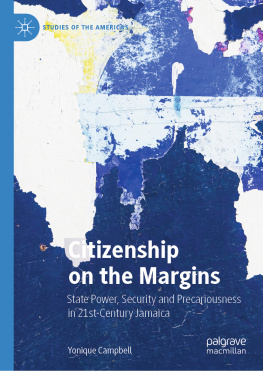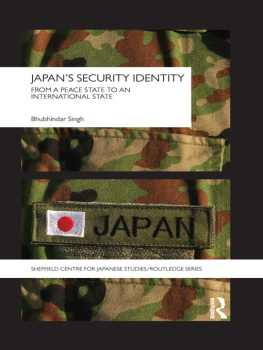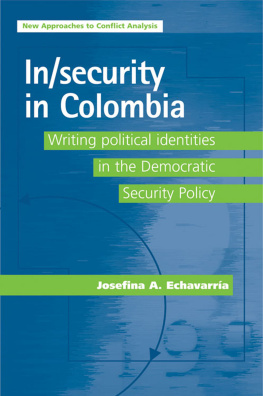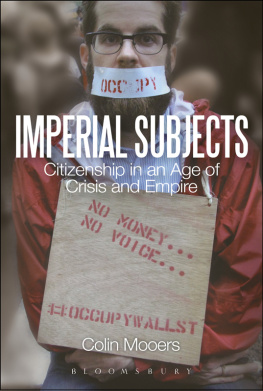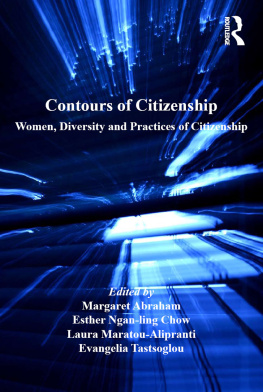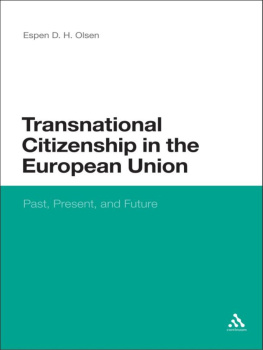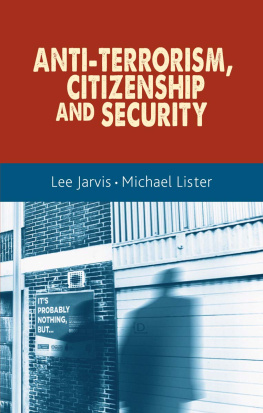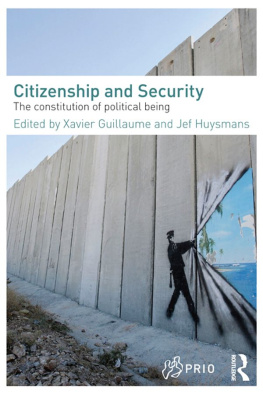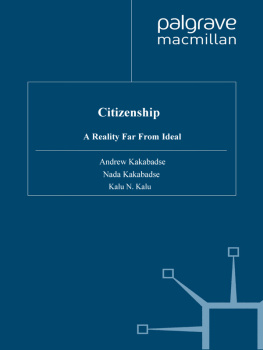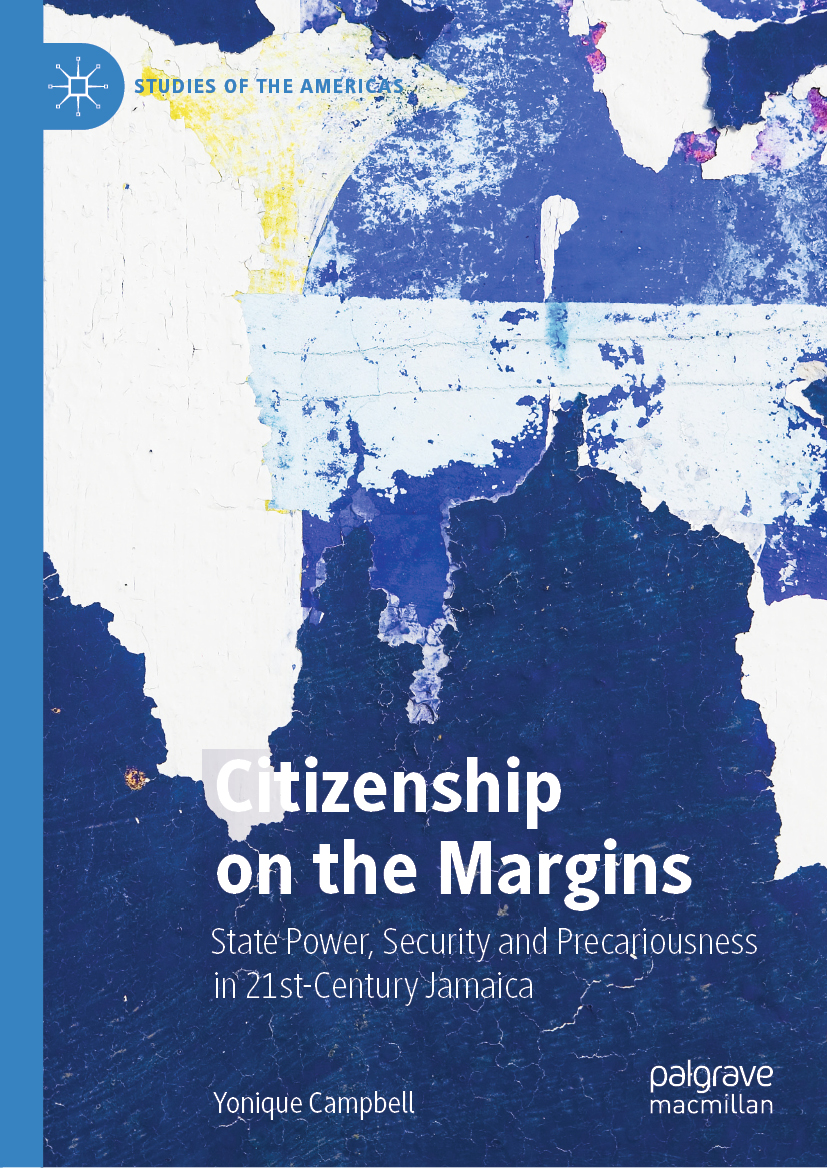Studies of the Americas
Series Editor
Maxine Molyneux
Institute of the Americas, University College London, London, UK
The Studies of the Americas Series includes country specific, cross-disciplinary and comparative research on the United States, Latin America, the Caribbean, and Canada, particularly in the areas of Politics, Economics, History, Sociology, Anthropology, Development, Gender, Social Policy and the Environment. The series publishes monographs, readers on specific themes and also welcomes proposals for edited collections, that allow exploration of a topic from several different disciplinary angles.
This series is published in conjunction with University College.
Londons Institute of the Americas under the editorship of Professor Maxine Molyneux.
More information about this series at http://www.palgrave.com/gp/series/14462
Yonique Campbell
Department of Government, University of the West Indies, Kingston, Jamaica
Studies of the Americas
ISBN 978-3-030-27620-1 e-ISBN 978-3-030-27621-8
https://doi.org/10.1007/978-3-030-27621-8
The Editor(s) (if applicable) and The Author(s), under exclusive license to Springer Nature Switzerland AG 2020
This work is subject to copyright. All rights are solely and exclusively licensed by the Publisher, whether the whole or part of the material is concerned, specifically the rights of translation, reprinting, reuse of illustrations, recitation, broadcasting, reproduction on microfilms or in any other physical way, and transmission or information storage and retrieval, electronic adaptation, computer software, or by similar or dissimilar methodology now known or hereafter developed.
The use of general descriptive names, registered names, trademarks, service marks, etc. in this publication does not imply, even in the absence of a specific statement, that such names are exempt from the relevant protective laws and regulations and therefore free for general use.
The publisher, the authors and the editors are safe to assume that the advice and information in this book are believed to be true and accurate at the date of publication. Neither the publisher nor the authors or the editors give a warranty, expressed or implied, with respect to the material contained herein or for any errors or omissions that may have been made. The publisher remains neutral with regard to jurisdictional claims in published maps and institutional affiliations.
Cover image: ETrayne04/Alamy Stock Photo
This Palgrave Macmillan imprint is published by the registered company Springer Nature Switzerland AG
The registered company address is: Gewerbestrasse 11, 6330 Cham, Switzerland
Foreword
It is almost sixty years since I began my doctoral fieldwork on Kingston, the capital of Jamaica. Since then I have published three books dealing with the history and geography of social inequality, race and poverty in Kingston, and it is a real pleasure to write the foreword to this monograph by my former graduate student, Yonique Campbell. Her book bears the title Citizenship on the Margins: State Power, Security and Precariousness in Latin America and the CaribbeanJamaicas Garrisons . My own urban fieldwork started early in 1961 while Jamaica was in the last stage of decolonization. In September of that year Jamaica rejected its role as the major component in the West Indies Federation; in a referendum it pulled out of the Caribbean multi-island colony; and in 1962 Jamaica became independent of Britain as a sovereign state. Jamaican colonial subjects of the British crown thereafter became citizens of Jamaica, and the entire population was, in theory, incorporated into the states political and legal systems on the basis of universal adult suffrage and social equality, irrespective of class, creed, race or colour.
However, citizenship as expressed by de jure incorporation, has not been universally achieved since 1962 in the garrison communities, especially in Kingston. Here the vast majority of the electorate, who compose the five political constituencies in West Kingston, vote for a single party, achieving majorities of over 90%. Insecurity and violence are the norms in these neighbourhoods, and alternative ways of seeking citizenship de facto have been pursued among their urban, lower-class residents. While the Kingston upper and middle class largely live by North American standards and values, downtown lower-class youths have been socialized into a get-rich-quick mentality (get-dead-quick reality), given that they lack the education and supports (family and community) to achieve material well-being by socially acceptable avenues. Hence the preoccupation with hard drugs, the emergence of local gang leaders or dons, and the transformation of many downtown districts in Kingston into nihilistic, no-go areas of which the garrison communities are outstanding exemplars.
This marginalized proletariat has become increasingly dominated by dons who offer their own version of citizenship. Gang leaders dispense a range of benefits to their followers, provided they accept a Faustian pact which involves support for, and identification with, the don. This requires voting for the dons political candidate at election time, turning a blind eye to drug trafficking as required by his gang, and accepting an alternative type of don-approved informal citizenship outside the law as conceived by the Jamaican state and the police. These alternative states-within-a-state form a continuous band following the waterfront on either side of the Spanish Town Road, encompass all five garrisons, and are markedly secular and materialistic.
Yoniques Turl Head community, adjacent to May Pen in Clarendon, is also a garrison, while her suburban Market Heights represents a middle-class neighbourhood in Kingston that has sufficient resources to privatize much of its dependence on the state for security.
Propelled by material needs into the arms of the dons, the urban poor find that the offer of citizenship comes at a price. It is citizenship de facto, outside the citizenship de jure enjoyed by the average Jamaican, which conforms to the state-approved legislation prescribed by decolonization and subsequently amended by the national legislature. De jure citizenship incorporates the upper and middle classes, black, brown (and white), together with the non-garrison, but largely black lower-class followers of the Pentecostal, Seventh Day Adventist and Church of God religions. Differentially incorporatedbecause they draw their variant of citizenship from the bond between don and followerthe lower-class black residents without religious faith have come to occupy a distinctive space in the geography of West Kingston, where they endure a life of material deprivation environed by the ghetto and, above all, by the garrison communities, of which the outstanding case is undoubtedly Tivoli Gardens.
Yonique uses her three communitiesan urban garrison (Tivoli Gardens), a small-town garrison (May Pen) and a middle-class Kingston suburb to investigate the links between class, security and citizenship in Jamaica. By interviewing representatives of the policy elite and non-governmental institutions she is able to interrogate policy and institutional approaches to security at the national level, and to evaluate whose citizenship rights are important and non-negotiable (middle- and lower-class Kingstonians) and whose are not (inhabitants of the Kingston garrisons). The marginal role of the police in Tivoli Gardens is underlined, while respect, violence and political identity are shown as characteristic of each of the garrisons explored in the book. While the police see themselves as guarantors of civil society for the middle class and privileged part of the lower class, the garrisons are essentially beyond the law. As the class structure of Kingston is clearly depicted in its spatial structure, so too is the spatial separation of those with civil rights

